PM Imran rolls out Rs80b anti-poverty plan
Imran unveils ‘Ehsas’ programme to uplift vulnerable segments of society
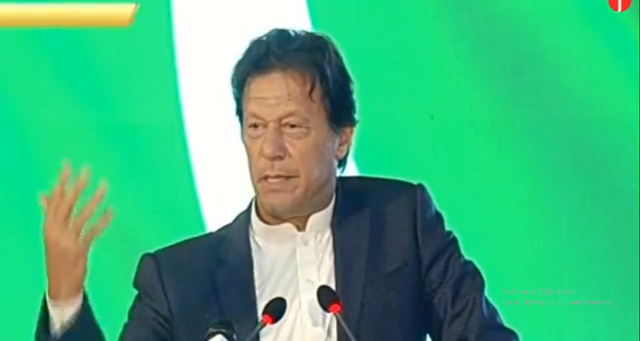
Country's premier was addressing a ceremony for the government's poverty alleviation programme .SCREENGRAB: PTV
Prime Minister Imran Khan on Wednesday rolled out a Rs80 billion poverty alleviation programme "Ehsas" – aimed at uplifting the downtrodden and vulnerable segments of society.
The government will allocate an additional amount of Rs80 billion in the country's social protection spending in backward areas from the current year, raising it to Rs120 billion in 2021.
"The government has launched a war against poverty," the prime minister said while addressing the inauguration ceremony of the programme.
He said an amendment would soon be made to the Constitution, moving Article 38(d) from the "Principles of Policy" section into the "Fundamental Rights" section.
This will make it a fundamental right for all citizens to be given food, shelter, education and health facilities by the state.
The prime minister also announced the establishment of a new ministry to alleviate poverty.
Various institutions likes the Benazir Income Support Programme, the Pakistan Baitul Mal and the Pakistan Poverty Alleviation Fund will work under the new ministry, developing a one-window operation for the social protection of the poor and to facilitate citizens.
No human being should be denied a decent living standard and unfortunately with the focus of previous governments being corruption no one has genuinely worked for the many without basic human needs.#GhareebKaEhsas pic.twitter.com/Lh2LFp2641
— PTI (@PTIofficial) March 27, 2019
"Making the provision of food, clothing, housing, education and medical relief to citizens a state responsibility is a first step towards the creation of a welfare state," the prime minister said.
Under the "Kifalat" programme, the government is designing a conditional cash transfer for healthcare and education of six million women and families so that they can have access to nutrition assistance.
The prime minister said he was establishing a multi-sectoral nutrition coordinating body within his office. It will also include the private sector to ensure food fortification and supplementation, he added.
"Sanitation and clean water are essential to stop stunted growth in children. It is worrying to see how contaminated milk is being sold in different parts of the country," he noted.
Under the new programme, 5.7 million women will be given savings accounts under the "one woman one bank account plan".
The prime minister said 500 Benazir Income Support Programme and Pakistan Bait-ul-Mal offices would be transformed into digital hubs where the government's IT, technology and innovation resources would be pooled.
The government's digital resources, such as access to the labour information system, online curricula, and one window social protection interface would be accessible and create opportunities for BISP families to lift out of poverty.
Under Kifalat, the government will increase the current Benazir Income Support Programme cash transfer of Rs5,000 to Rs5,500.
The government is launching a precision safety net, called "Tahafaz" to protect individuals from catastrophic risks - a transparent and trackable digital system of cash transfers through which the government will give legal aid, education grants and health assistance to those without Insaf card entitlements.
Khan said the government had already committed to launching the Insaf Insurance Card in 38 districts for 3.3 million people over a four-year period and had committed Rs33 billion for this purpose. In addition, through "Tahafaz", the government will cater to additional needs of those requiring financial access to treatment. The government will make sure every poor and deserving person approaching public hospitals has access to treatment and surgery.
The government will also set up shelter homes in several major cities of the country. The government's housing scheme will focus on facilitating provision of homes to the poor, including landless farmers, through interest-free loans. The government has allocated Rs4.5 billion for this purpose.
The Pakistan Bait-ul-Mal will establish five Ehsas homes this year, and the number would be raised by the passage of time.
"In the next four years, the Bait-ul-Maal will provide shelter for 10,000 orphaned children," Khan said.
Referring to the government's five million housing programme, Khan said the government would ensure that women were given joint ownership of houses.
The government is launching a programme under which wheelchairs, tripod and quadripod sticks and crutches will be provided to disabled people.
In addition, the government will partner with the civil society and expert organisations to develop 20 centres for the disabled people in underprivileged districts.
The government is adopting a new policy of placing placards outside of each basic health unit and hospital mentioning the amount allocated and the staff meant to be present there to increase transparency.
The prime minister said he had instructed all protectors of emigration office to create a single window for all types of requirements and make workers aware about their entitlements.
"The government has decided that migrant unskilled workers, earning less than a given income and who have not visited home for more than seven years, will be provided subsidy on air tickets," Khan announced.
He also announced an increase in the monthly labour pension through Employees Old Age Benefit Institution from Rs5,250 to Rs6,500. Biometric payments will be used for all labour pensioners from next year to counter pilferage.
The prime minister said being aware of the special problem of the inability to reach children where there were dispersed populations, the government would make e-learning content freely available online and use chat bots in local languages for displaced populations.
The government will allocate Rs3 billion per year for scholarships in the higher education particularly in backward areas. The prime minister also announced a policy of corporate farming to help farmers with fragmented and small land holdings
This will provide market stimulus for livestock and fisheries in arid zones to create livelihood opportunities for small farmers.
The government will work on facilitating the expansion of microfinance services to reach remote areas.
It will would include skill-training in school curricula from 8th class.
The age of enrollment in technical training is also being decreased from 18 to 15 so that after matriculation and skill-training can be started immediately.
To facilitate remittances, the government is introducing a slab for remitters of up to $100 with half of the existing fee.


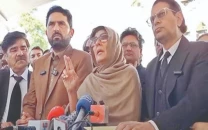
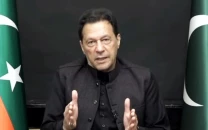
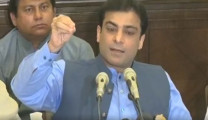
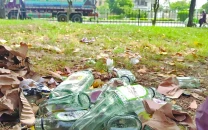













COMMENTS
Comments are moderated and generally will be posted if they are on-topic and not abusive.
For more information, please see our Comments FAQ